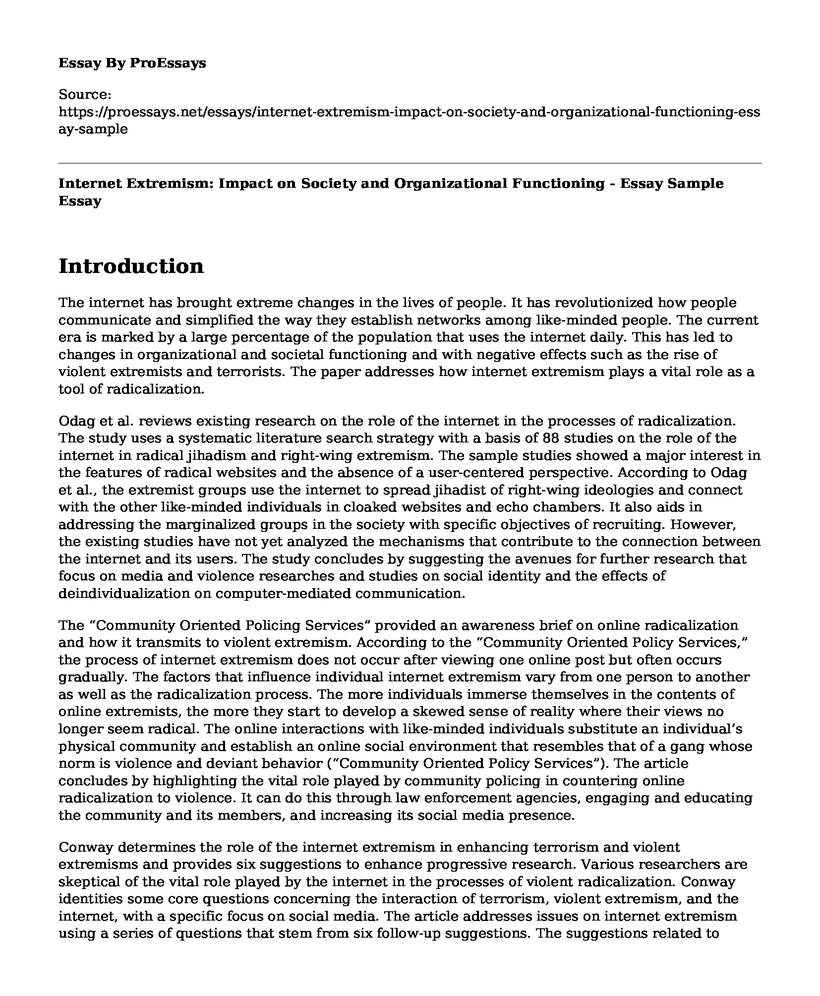Introduction
The internet has brought extreme changes in the lives of people. It has revolutionized how people communicate and simplified the way they establish networks among like-minded people. The current era is marked by a large percentage of the population that uses the internet daily. This has led to changes in organizational and societal functioning and with negative effects such as the rise of violent extremists and terrorists. The paper addresses how internet extremism plays a vital role as a tool of radicalization.
Odag et al. reviews existing research on the role of the internet in the processes of radicalization. The study uses a systematic literature search strategy with a basis of 88 studies on the role of the internet in radical jihadism and right-wing extremism. The sample studies showed a major interest in the features of radical websites and the absence of a user-centered perspective. According to Odag et al., the extremist groups use the internet to spread jihadist of right-wing ideologies and connect with the other like-minded individuals in cloaked websites and echo chambers. It also aids in addressing the marginalized groups in the society with specific objectives of recruiting. However, the existing studies have not yet analyzed the mechanisms that contribute to the connection between the internet and its users. The study concludes by suggesting the avenues for further research that focus on media and violence researches and studies on social identity and the effects of deindividualization on computer-mediated communication.
The “Community Oriented Policing Services” provided an awareness brief on online radicalization and how it transmits to violent extremism. According to the “Community Oriented Policy Services,” the process of internet extremism does not occur after viewing one online post but often occurs gradually. The factors that influence individual internet extremism vary from one person to another as well as the radicalization process. The more individuals immerse themselves in the contents of online extremists, the more they start to develop a skewed sense of reality where their views no longer seem radical. The online interactions with like-minded individuals substitute an individual’s physical community and establish an online social environment that resembles that of a gang whose norm is violence and deviant behavior (“Community Oriented Policy Services”). The article concludes by highlighting the vital role played by community policing in countering online radicalization to violence. It can do this through law enforcement agencies, engaging and educating the community and its members, and increasing its social media presence.
Conway determines the role of the internet extremism in enhancing terrorism and violent extremisms and provides six suggestions to enhance progressive research. Various researchers are skeptical of the vital role played by the internet in the processes of violent radicalization. Conway identities some core questions concerning the interaction of terrorism, violent extremism, and the internet, with a specific focus on social media. The article addresses issues on internet extremism using a series of questions that stem from six follow-up suggestions. The suggestions related to engaging in more comparative research that entails groups, languages, and countries as opposed to across ideologies; widening the range of the categories of online violent extremism; increasing the capacity to conduct “big data” collection and analysis; deepening analysis to incorporate virtual ethnographic approaches; researching beyond terrorism studies; and focusing more on gender as a factor of violent online extremism (Conway).
Conclusion
To conclude, the internet provides extremists with a platform to broadcast their views, incite people to violence, and provoke negative sentiments towards enemies. It enables people to establish virtual communities of like-minded individuals with their religious and legal justifications. Vital steps should, therefore, be implemented to regulate internet extremism.
Works Cited
“Community Oriented Policy Services.” Online radicalization to violent extremism. U.S. Department of Justice, 2014. https://www.theiacp.org/sites/default/files/2018-07/RadicalizationtoViolentExtremismAwarenessBrief.pdf
Conway, M. Determining the role of the internet in violent extremism and terrorism: Six suggestions for progressive research. Taylor& Francis Online, 2017. https://www.tandfonline.com/doi/full/10.1080/1057610X.2016.1157408
Odag, O. et al. Reviewing the role of the internet in the radicalization process. Journal of Deradicalization, 2019. https://journals.sfu.ca/jd/index.php/jd/article/view/289/197
Cite this page
Internet Extremism: Impact on Society and Organizational Functioning - Essay Sample. (2023, Aug 09). Retrieved from https://proessays.net/essays/internet-extremism-impact-on-society-and-organizational-functioning-essay-sample
If you are the original author of this essay and no longer wish to have it published on the ProEssays website, please click below to request its removal:
- Personal Internet Use and Risk Management Essay Example
- Cyber Security as National Security Threats Essay
- Ebooks and Paper Books Essay Example
- Problem Related to the Information Systems Paper Example
- Learning and Hopfield Networks Essay Example
- Essay Example on Tech Crime: Balancing Justice and Security With New Technologies
- Essay Example on Best Info System Infra: Hardware, Software, Networks, Data, Procedures







